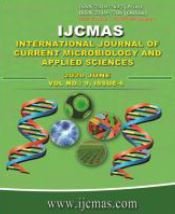


 National Academy of Agricultural Sciences (NAAS)
National Academy of Agricultural Sciences (NAAS)

|
PRINT ISSN : 2319-7692
Online ISSN : 2319-7706 Issues : 12 per year Publisher : Excellent Publishers Email : editorijcmas@gmail.com / submit@ijcmas.com Editor-in-chief: Dr.M.Prakash Index Copernicus ICV 2018: 95.39 NAAS RATING 2020: 5.38 |
Soil salinity is one of the major factors responsible for poor germination and plant growth, ultimately limiting crop yield. This research was conducted to evaluate 10 genotypes of mustard at four levels of salinity based on electric conductivities (ECs) viz. 0.0 EC, 6 EC, 10 EC and 12 EC. Observations on twelve parameters were recorded including germination percent and early generation seedling traits. The genotypes exhibited significant differences among all the traits in all the levels of salinity concentrations. The mean values of all the parameters significantly reduced with the increase in the salinity level. The maximum reduction was observed in germination percentage followed by shoot length while and least affected trait was root dry weight. Genotypes RH – 406, RGN – 229, RGN - 145 and RGN - 48 showed tolerance and provided overall high stability results in higher salinities. These genotypes further can be exploited to increase the genetic base of existing lines of tolerant mustard genotypes and can be grown in marginalized salt affected land to increase productivity.
 |
 |
 |
 |
 |